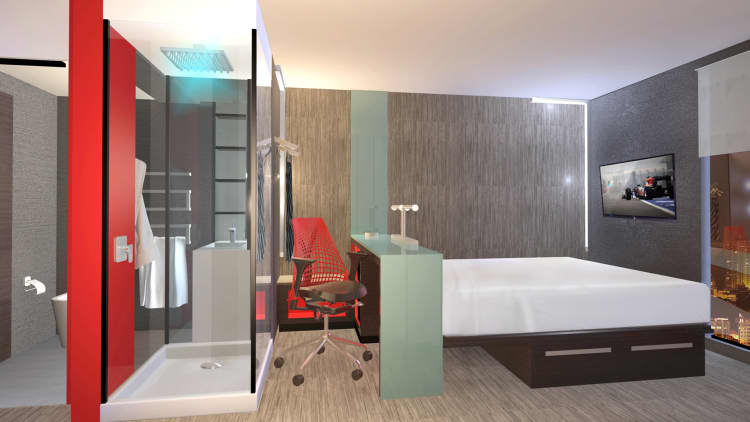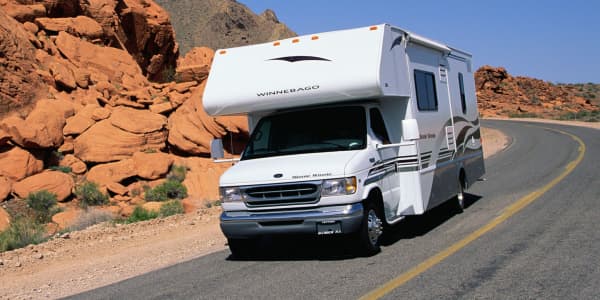
It's now 2017 — you work in coffee shops, your smartphone controls your home and car, and your business trips are short, two-day jaunts with a bit of leisure thrown in.
Why can't your hotel be the same way?
New hotels seek to capitalize on that question. Out are the large but dark rooms, the voluminous dressers and utilitarian corner gyms, replaced by cozier rooms, bright common spaces, natural lighting and centerpiece gyms.
New designs emphasize common areas both intimate and public at once, evocative of a restaurant dinner or coffee shop meeting. Rooms are shrinking, but lobbies are growing, providing ample seating and tables — and even cabanas, for those who want more privacy.
Modern hotels are "creating home away from home for road warriors," said Guy Langford, U.S. leader of the travel, hospitality and leisure practice at consulting firm Deloitte. "Some of the boutique brands, in some of the hotel lobby and common areas, they feel like they're in someone's living room."
It's "the concept of having an experience," Langford said.
Yotel, a British chain that began with compact, 75-square-foot "cabins" attached to London's Heathrow and Gatwick airports in 2007, was an early entrant into the space. The properties' compact designs were inspired by a trip to Japan by Yotel CEO Simon Woodroffe.
"In Asia, what they're really good at is mixing contemporary and tradition," says Jo Berrington, vice president of brands at Yotel. "They have a lot of challenges with space in a small area.
"There's no reason why that can't be adapted to the Western market," she added.
Japan may have inspired Woodroffe, but the actual catalyst was, in fact, an upgrade on a British Airways flight that left him "amazed at how luxurious design could be in a compact space," said Berrington. "Instead of paying for hotel space you didn't utilize, make a smaller space, making sure owners and developers were getting better value for money."
Some of the boutique brands, in some of the hotel lobby and common areas, they feel like they're in someone's living room.Guy LangfordU.S. leader, Deloitte's travel, hospitality & leisure practice
Industry incumbents are starting to pick up on the trend. In May, Hilton introduced its Tru brand with the opening of its first location at Oklahoma City Airport. For its part, Best Western is planning a one-two punch, rolling out both the upper-scale Vib and budget-friendly Glo brands.
Technology at this new breed of hotel is both pervasive and personal, with an emphasis on using your own devices rather than a provided (and oftentimes outdated and clunky) in-house device.
Both Tru and Vib will offer "digital keys," allowing guests to unlock doors directly from their smartphones. Yotel includes LED mood lighting, while Vib lets guests stream music and movies to the room's smart TVs and sound system.
Rooms are smaller but cozier. Tru has stripped away its closets and dressers in favor of wall hooks and open pipe shelving. Yotel integrates a small desk directly into the headboard of the bed and offers a "smart bed" that converts into a couch at the touch of a button.
"We want to be very strategic on where we make compromises or sacrifices at the price point," said Alexandra Jaritz, global head of Tru by Hilton. "How do we make it aesthetically pleasing and functionally efficient?"
This revolution in guest-room design is not due to costs but competition: According to industry statistics, the hotel industry has been experiencing steady growth for 84 months as new entrants in this sector are introducing innovative brands and designs that are the combined result of changing consumer trends, hospitality research and the "Airbnb effect," Deloitte's Langford said.
With the rise of Airbnb, hotels now find themselves literally in competition with people's living rooms. The online hospitality marketplace has created demand for "having experiences and feeling they were in an environment where they were comfortable," Langford said.
Yotel even sees Airbnb as complementary to its offerings. "With Airbnb, it works much better for a much longer stay, but I think the hassle of it and much personal experience can be quite daunting if you only have a one- or two-night stay in a city you don't know," Berrington said.
The legacy chains entering the market remain optimistic about hotel products both old and new. Vib, for example, gives Best Western a foothold in higher-end markets, while Glo provides an alternative to its existing core brand — despite the risk of cannibalization. That's because "not all customers want [the Vib or Glo] type of approach," said Ron Pohl, COO of Best Western Hotels & Resorts. Meanwhile, Tru's Hilton branding communicates quality and consistency, according to Jaritz, and guests can participate in the company-wide Hilton Honors rewards program.
In short, the rise in new brands and offshoots is an easier way for legacy hospitality chains to stay competitive with new players such as Yotel and Airbnb. "It's kind of like renovating a house versus building anew," said Langford. "Sometimes you need to start with a fresh sheet of paper."
CORRECTION: This story has been updated to reflect that Yotel guest rooms are currently featuring "smart beds" that convert into couches.
— By Mike Juang, special to CNBC.com





